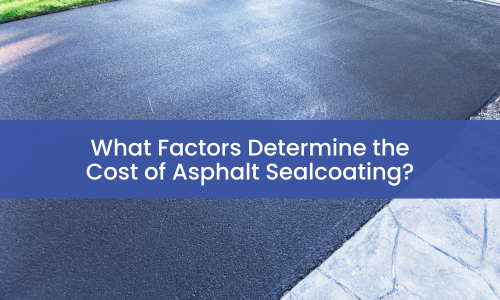Asphalt sealcoating is priced by the job and is determined on a number of factors. A trusted pavement contractor can provide a detailed estimate for any asphalt sealcoating project. The following factors will be considered in the estimate and influence the project’s cost:
- The size of the asphalt pavement
- The amount of traffic the pavement must accommodate
- The asphalt’s current condition
- Any complexities that may be involved with the project
Here is more information on each of these factors and how they can affect the cost of asphalt sealcoating.
1) The Size and Area of the Asphalt Pavement
The size and area of the asphalt is the number one factor in determining sealcoating costs. The larger the pavement’s area, the higher the price. For a commercial parking lot, property owners typically pay between $.10 and $.35 a square foot, which means for a typical parking lot space (which is about 200 square feet in area), you’ll pay between $20 and $70 per space. Each parking spot needs an additional 100-200 square feet to allow for vehicles to maneuver safely through the parking lot, so the final area per space is between 300 and 400 square feet. If you know how many spaces your parking lot has, you can get a rough estimate of the project’s size and cost from there.
2) The Amount of Traffic the Asphalt Paving Accommodates
If the asphalt pavement handles heavy vehicle traffic, in either the number of vehicles or their weight, it may require more than one layer of asphalt sealcoat. In fact, reputable pavement contractors recommend at least two coats for commercial asphalt, though a third coat may be needed for areas that see heavy trucks, oversized machinery and other commercial traffic.
Additional coats of asphalt sealcoat will cost extra, but the increase is not linear as two coats do not necessarily cost twice as much money. You’ll typically get a slight discount per square foot with each subsequent layer of sealcoating, and the additional protection is well worth it.
3) Any Cleaning and Repairs Needed Prior to Asphalt Sealcoating
Before sealcoat can be applied to asphalt pavement, it must first be properly cleaned and repaired. Any debris or surface damage will interfere with how the sealcoat adheres to the pavement.
Prior to the sealcoat application, it’s highly recommended that property owners give their asphalt a thorough power sweeping and washing. Power sweeping is typically charged by the hour, while power washing services often charge by the square foot.
Repairs are also recommended if your asphalt has cracks, potholes, or other forms of damage. Your pavement contractor can provide an estimate for any repair costs. In general, the better your pavement’s condition, the less it will cost to get it ready for sealcoating.
4) Additional Complexities and Considerations
Every asphalt sealcoating project is unique because every piece of asphalt pavement is unique. If the pavement’s layout or design makes it difficult for the pavement crew to efficiently do their job, there may be additional costs. For example, a parking lot with a variety of large landscaped areas may slow down the work team. Limited site access may also delay efforts, and if your property needs to do the project in phases – to avoid shutting down the entire parking lot, for example – then additional mobilizations (equipment and manpower deployments) may be necessary to complete the job. This may also affect the project’s cost.
If your pavement must remain at least partly operational throughout the project’s timeline, an experienced paving crew can optimize their work efficiency around your property’s needs.
Three Reasons Why Property Owners Should Consider Asphalt Sealcoating
Although the cost of asphalt sealcoating varies from one property to another, it is consistently a good value for commercial property owners. Here are three reasons why asphalt sealcoating is worth the investment:
- Improved pavement durability and lifespan – Asphalt sealcoat provides a protective layer for your pavement. You can think of it like a layer of wax shielding the asphalt from wear, weather, and UV radiation. As soon as it cures, asphalt sealcoat improves the pavement’s wear performance by essentially “gluing” the surface aggregate together. By enhancing the asphalt’s overall durability, regular sealcoating will improve the pavement’s lifespan by years.
- Improved road performance – Asphalt sealcoat leaves the pavement with a smooth texture that makes for a more consistent driving experience. If your asphalt has a lot of traffic, sealcoating the asphalt will facilitate better flow through your paved areas and improve safety – for both motorists and pedestrians.
- Improved asphalt appearance – Asphalt sealcoat leaves the pavement with that rich black color that people associate with new asphalt. It’s an instant curb appeal boost and can leave potential customers with a better impression of your business.
Asphalt sealcoating is the least expensive form of preventative maintenance and can extend your pavement’s useful life by many years. For most commercial property owners, it is a financially prudent decision. For optimal results, pavement contractors recommend sealcoating commercial asphalt every 18-24 months.
A Reputable Pavement Contractor Can Estimate the Cost of Your Asphalt Sealcoating Project
The cost of asphalt sealcoating your pavement will depend on the asphalt’s size, condition and usage profile. There may be additional factors involved that the pavement team will only be able to assess in person. If it’s time to schedule a round of asphalt sealcoating for your pavement, a trusted asphalt paving expert can provide a detailed estimate for your project.
- HOA & Condos – How Asphalt Pavement Can Affect Your Houston Property Values - March 6, 2025
- What Certifications or Licenses Should a Houston Asphalt Contractor Have? - September 17, 2024
- Common Challenges in Concrete Construction - September 11, 2024

